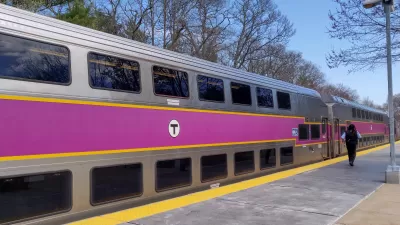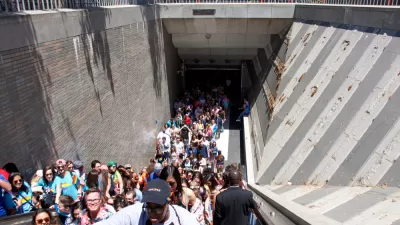Transit ridership has surged in other countries but lags here in the United States. The possible reasons for this are varied as are proposed solutions for improving American transit systems.

Aditi Shrikant considers the current state of transit in the United States and reasons for the lack of public concern about quality of service and public investments. Ridership here is much lower than in Asian and European countries, and Shrikant points out that the most robust transit systems are in large northern and coastal cities.
American public transit has faced a myriad of problems, including safety issues, political resistance and controversy, and negative public perceptions. One reason it has not improved may be that Americans do not use public transit enough or fully understand how systems operate, and so they have less interest in transit policy and funding.
Another possibility is that the United States has not developed the kinds of modern transit systems seen in other countries. As a result, it lags behind in providing the state-of-the-art transit needed to transport large numbers of people.
One solution to boost public transit looks to shift travelers’ incentives rather than focusing on expanding transit systems, reports Shrikant. For example, higher gas prices and congestion charges are two disincentives to driving that encourage people to move to transit.
FULL STORY: Why US public transportation is so bad — and why Americans don’t care

Planetizen Federal Action Tracker
A weekly monitor of how Trump’s orders and actions are impacting planners and planning in America.

Map: Where Senate Republicans Want to Sell Your Public Lands
For public land advocates, the Senate Republicans’ proposal to sell millions of acres of public land in the West is “the biggest fight of their careers.”

Restaurant Patios Were a Pandemic Win — Why Were They so Hard to Keep?
Social distancing requirements and changes in travel patterns prompted cities to pilot new uses for street and sidewalk space. Then it got complicated.

Platform Pilsner: Vancouver Transit Agency Releases... a Beer?
TransLink will receive a portion of every sale of the four-pack.

Toronto Weighs Cheaper Transit, Parking Hikes for Major Events
Special event rates would take effect during large festivals, sports games and concerts to ‘discourage driving, manage congestion and free up space for transit.”

Berlin to Consider Car-Free Zone Larger Than Manhattan
The area bound by the 22-mile Ringbahn would still allow 12 uses of a private automobile per year per person, and several other exemptions.
Urban Design for Planners 1: Software Tools
This six-course series explores essential urban design concepts using open source software and equips planners with the tools they need to participate fully in the urban design process.
Planning for Universal Design
Learn the tools for implementing Universal Design in planning regulations.
Heyer Gruel & Associates PA
JM Goldson LLC
Custer County Colorado
City of Camden Redevelopment Agency
City of Astoria
Transportation Research & Education Center (TREC) at Portland State University
Camden Redevelopment Agency
City of Claremont
Municipality of Princeton (NJ)





























